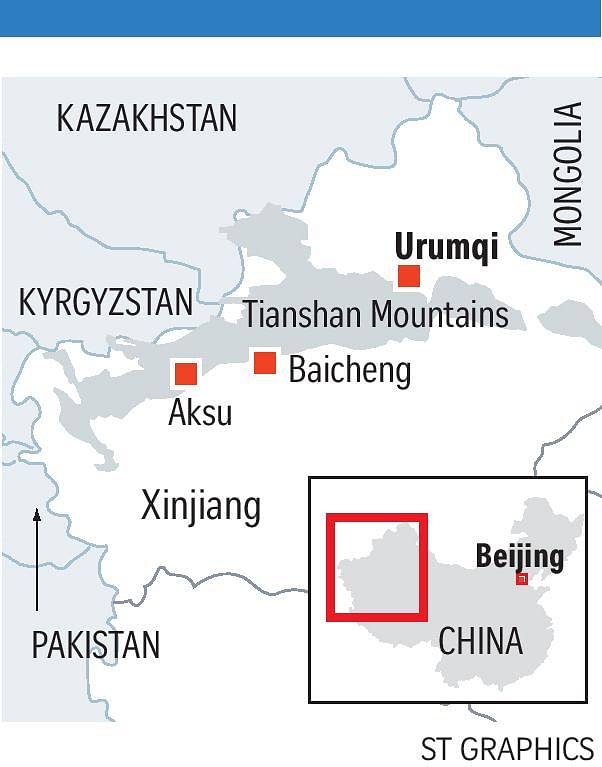BAICHENG (China) • Armed with only knives, the assailants struck the coal mine in the dead of night - first killing the security guards, then setting upon the miners as they slept.
Before the Sept 18 rampage in China's Xinjiang was over, more than 50 people were dead, at least five of them police officers, with dozens more wounded, say victims' relatives and residents.
Most of the victims were Han Chinese lured to this desolate corner of far west Xinjiang by the prospect of steady work and decent pay.
Wanted posters displayed later in Baicheng County, where the Sogan coal mine is located, suggest the attackers were ethnic Uighurs, a mostly Muslim Turkic-speaking minority. The attackers apparently escaped into the Tianshan Mountains, not far from China's border with Kyrgyzstan and Kazakhstan.
The Sogan coal mine attack appears to be one of the deadliest acts of violence in Xinjiang in recent years, underscoring the challenges Beijing faces as it tries to maintain order in a region nearly as large as the US state of Alaska. The violence has continued despite a heavy security crackdown and billions of dollars in government spending that aims to quell discontent among the Uighurs.
The coal mine attack occurred during national celebrations to mark the 60th anniversary of the establishment of the Xinjiang Uygur Autonomous Region, and government officials have been trying to keep news of the killings from seeping beyond rural Baicheng County.
Details of the massacre were first published last month by Radio Free Asia, a news service financed by the United States government and blocked by China's government.
A Communist Party official interviewed by Radio Free Asia gave a reason for the media blackout: "We are controlling information so strictly, lest we frighten Han migrants."

Last week, the county seat was bristling with heavily armed police officers and was subject to a night-time curfew. But despite the siege atmosphere, many residents said they knew little about what had happened at the coal mine.
"We don't know anything, and we feel safer if it stays that way," the desk clerk of a local hotel said. Lingering across from her in the lobby was a group of special forces officers from other parts of China. Another clerk suggested that they had replaced local officers whose loyalties could not be entirely trusted.
"We have many Uighur police in Baicheng, and sometimes they might just cut people some slack if they are of the same ethnicity," said the clerk, Ms Xiong Zhaoxia, 27.
Her sentiments speak volumes about the mistrust between the Han Chinese and the Uighurs. The two ethnic groups have little in common, and they often cannot speak the same language.
The resentment among Uighurs is fuelled by poverty, government restrictions on religious activities and a belief that Han outsiders benefit disproportionately from Xinjiang's plentiful natural resources.
"Sometimes when I look around me and see so many Hans, I feel like I am a stranger in my own homeland," said an Uighur engineer in Aksu, the prefectural capital.
The government invariably blames Muslim religious extremists for the violence, though analysts outside China say many attacks have little to do with militant ideology. "The triggers are often locally embedded, whether it be reprisal for a woman who's been publicly unveiled and her family shamed, or people striking back after a relative has been detained by police," said Xinjiang expert James Leibold, a professor of Asian studies at La Trobe University in Australia.
Radio Free Asia, citing a government official in Baicheng, said the attackers might have been seeking vengeance for what the official described as a coercive campaign to combat religious extremism.
On Liberation Street, the town's main commercial thoroughfare, many storefronts along the street were shuttered. Ms Xiong said many shop owners had left over the past year or so, joining an exodus of Hans who departed after some of Baicheng's cement plants, steel factories and coal mines closed down.
"Now, with this incident, I think the companies and businessmen will never come back," she said.
NEW YORK TIMES
